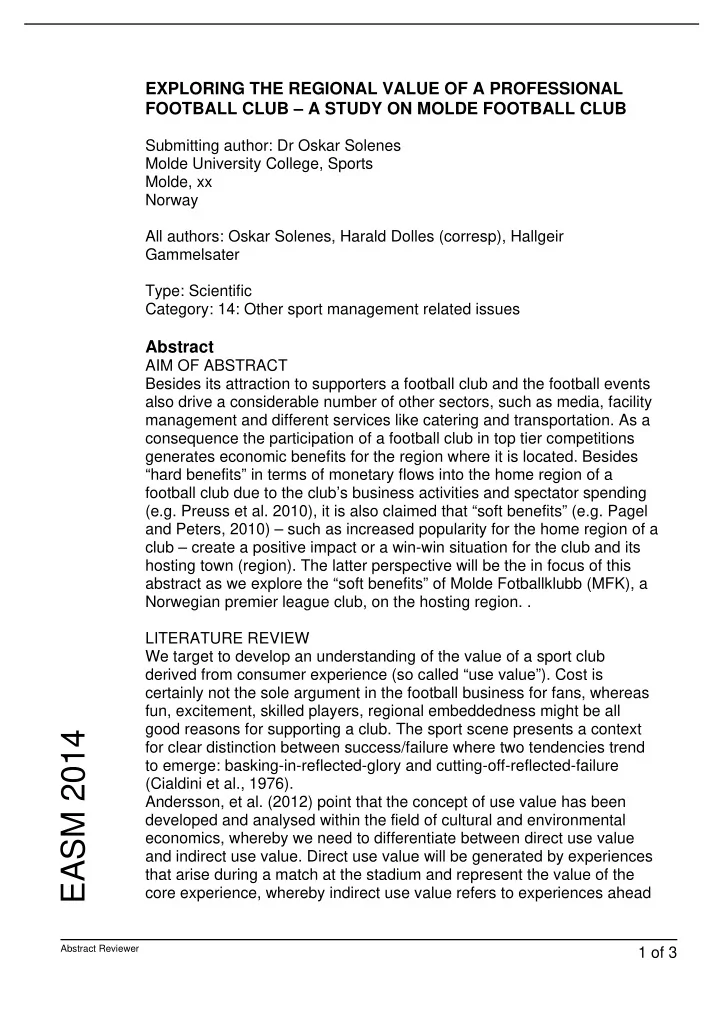

EXPLORING THE REGIONAL VALUE OF A PROFESSIONAL FOOTBALL CLUB – A STUDY ON MOLDE FOOTBALL CLUB Submitting author: Dr Oskar Solenes Molde University College, Sports Molde, xx Norway All authors: Oskar Solenes, Harald Dolles (corresp), Hallgeir Gammelsater Type: Scientific Category: 14: Other sport management related issues Abstract AIM OF ABSTRACT� Besides its attraction to supporters a football club and the football events also drive a considerable number of other sectors, such as media, facility management and different services like catering and transportation. As a consequence the participation of a football club in top tier competitions generates economic benefits for the region where it is located. Besides “hard benefits” in terms of monetary flows into the home region of a football club due to the club’s business activities and spectator spending (e.g. Preuss et al. 2010), it is also claimed that “soft benefits” (e.g. Pagel and Peters, 2010) – such as increased popularity for the home region of a club – create a positive impact or a win-win situation for the club and its hosting town (region). The latter perspective will be the in focus of this abstract as we explore the “soft benefits” of Molde Fotballklubb (MFK), a Norwegian premier league club, on the hosting region. .� � LITERATURE REVIEW� We target to develop an understanding of the value of a sport club derived from consumer experience (so called “use value”). Cost is certainly not the sole argument in the football business for fans, whereas fun, excitement, skilled players, regional embeddedness might be all good reasons for supporting a club. The sport scene presents a context EASM 2014 for clear distinction between success/failure where two tendencies trend to emerge: basking-in-reflected-glory and cutting-off-reflected-failure (Cialdini et al., 1976).� Andersson, et al. (2012) point that the concept of use value has been developed and analysed within the field of cultural and environmental economics, whereby we need to differentiate between direct use value and indirect use value. Direct use value will be generated by experiences that arise during a match at the stadium and represent the value of the core experience, whereby indirect use value refers to experiences ahead Abstract Reviewer 1 of 3
and after the match, including traveling from and to a match or the experiences during half-time, ahead of the match at the stadium, etc. We might further argue that greater societal value might also be created by a football club that is not necessarily associated with all citizens taking part in cultural activity. Instead the value may consist in society developing positively as a result of the existence of the club, thereby increasing cultural and social capital. This value can be termed “non-use value”.� � METHODOLOGY, RESEARCH DESIGN AND DATA ANALYSIS� Empirical data for this study consist of two different data sets. The first data collection was conducted between spring 2013 among people migrated from the Molde region as we wanted to explore whether and to what extend they keep being informed about the Molde-region and MFK. We interviewed 29 participants, 15 women and 14 men. The second data collection was conducted in November 2013, using an internet-based questionnaire distributed to MFK “customer groups”. Ahead of distribution a pre-test of the proposed instrument was conducted. In its final stage, the questionnaire was distributed by email to 1,434 registered email- addresses within the data base of MFK (we acknowledge the bias this sample might have and currently send out the same questions to a different group). Out of these 574 responded, giving a 40 per cent response rate. Data was collected on-line using Quest back, and then electronically imported into SPSS for statistical analysis.� � RESULTS, DISCUSSION AND IMPLICATIONS� Our survey demonstrates that MFK has an impact to people which initially did not define themselves as football fans (“non-use value”). It is obvious from their answers that there is a community pride and relation towards the club and its achievements, with positive value attached. In most cases, this does not come directly from stadium experience, but through media consumption. The regional embeddednes of MFK becomes even more obvious in the internet-based questionnaire as MFK is emphasized as one of the most important regional “brands” and Aker Stadium as Molde’s main landmark building, thus highlighting use and non-use value of the club in town. The results also indicate that fans clearly distinguish between the different value-offerings of a football club. The “use value” of the club within our two samples also becomes obvious in investigating the spending on MFK’s merchandizing and the EASM 2014 demonstrated knowledge about sponsors. This finding tends towards the transfer of use-value by supporters towards the club’s corporate partners in increased attention and joint community pride. The results so far from both surveys can be interpreted as showing that MFK succeeded in appealing to a broad public. References Andersson, T.D., Armbrecht, J. and Lundberg, E. (2012), Estimating use and non-use values of a music festival, Scandinavian Journal of Abstract Reviewer 2 of 3
Hospitality and Tourism, 12 (3): 215-231.� Pagel, S. and Peters, H. (2010), Die wirtschaftliche und gesellschaftliche Bedeutung von Fortuna Düsseldorf 1895 e V für die Sportstadt Düsseldorf [Economic and societal value of Fortuna Düsseldorf 1895 e.V. for Düsseldorf as a sport city], Press Conference (23.7.2010), available at http://www.sportstadt- duesseldorf.de/fileadmin/sportstadt/Vereine/Fortuna_08_07/sonstiges/For tuna_Praesentation_4-0-0_2010_07_22.pdf, accessed 15.01.2014.� Preuss, H., Könecke, T. and Schütte, N. (2010), Calculating the Primary Economic Impact of a Sports Club`s Regular Season Competition: A First Model, Journal of Sport Science and Physical Education, 60: 17-22.� Cialdini, R.B., Borden, R.J., Thorne, A., Walker, M.R., Freeman, S. & Sloan, L.R. (1976). Basking in reflected glory: Three (football) field studies, Journal of Personality and Social Psychology, 34, 366-375. EASM 2014 Abstract Reviewer 3 of 3
Recommend
More recommend